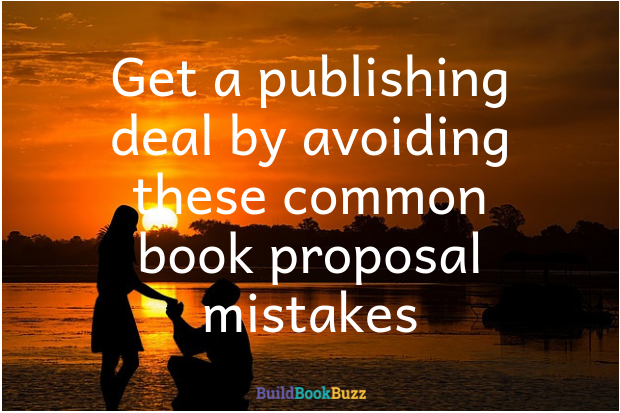Get a publishing deal by avoiding these common book proposal mistakes

Jenna Glatzer is one of my favorite writer friends and humans. I admire her for many reasons, but one is that she’s an accomplished and successful author. Jenna is the author or ghostwriter of more than 30 books, including Celine Dion’s authorized biography. She’s written for all five of the “Big Five” U.S. publishers, mostly in the memoir, true crime, business leadership, and health categories. Learn more about Jenna on her website.
Get a publishing deal by avoiding these common book proposal mistakes
By Jenna Glatzer
Your book proposal determines your publishing fate.
Write a stellar proposal about a nonfiction book concept with mass appeal and you’ll have no problem landing a literary agent and getting a significant advance from a major publisher.
But writers often make mistakes in a few common areas when working on this essential marketing tool.
Here are seven of the most common book proposal mistakes I’ve seen and tips for fixing them.
1. This book is for everybody.
Often, new writers believe their book idea is so amazing that literally everyone is going to want to read it—so that’s what they say.
But publishers don’t want to hear that.
“Everybody” is not a target audience.
In your “Market” section, you must define who is most likely to read your book and why.
Don’t bother listing the outliers. List your core audience and any secondary audience that passes the BS test.
For instance, the audience for most books about parenting a baby is pregnant women and new moms in their 20s and 30s.
Will dads read it, too? Sure, some will, so they can be your secondary market. Will grandparents? No. You may get a few, but be real: if large numbers of them aren’t going to spend the money on a book like this, don’t mention them.
2. This book is for, like, five people in Canada.
Here’s the corollary to that: A writer sent me her pitch to critique, and the target market was so detailed and specific that I couldn’t think of more than two people who fit all the qualities she described. (“This book is for athletic entrepreneur women in their 20s who are fashion-conscious and attend religious services regularly” is an approximation of her description.)
If you’re aiming for a traditional publisher and bookstore sales, you need to show that your book has a sizable, proven market. Something ultra-specific, like “How to Start an A Cappella Group,” is probably better suited to self-publishing.
3. There’s never been a book like it!
It’s counterintuitive—you’d think publishers would love hearing that your book is going to be the first of its kind, but nope. They want new twists, but mostly on tried-and-true topics.
If you say there’s never been a book like this, publishers are going to question why. Does that mean there’s no market for it?
4. Okay, there have been books like this in 1982!
Sometimes writers try to downplay the competing books by pulling up things they think will seem outdated.
And sometimes it’s legitimate that the closest books on the topic came out a long time ago.
That’s not good. As much as possible, you’ll want to include books published in the past 10 years that are still in print, even if they’re not perfect matches.
5. . . . but the other books are all terrible!
You don’t need to (and usually shouldn’t) bash the competition.
The idea of the competition section isn’t to show that other books on your topic are terrible. It’s just to show that yours is going to be different and/or better in some way.
It’s not smart to put down successful books. For one thing, editors play musical chairs and you don’t know if the editor you’re submitting to had a hand in that successful book or is a big fan of the author.
6. I’ve been all over the media.
One problem I’ve encountered with several of my memoir ghostwriting clients is media over-saturation.
They were in the news at one time, and then thought, “Hey, I’m on Oprah . . . I should probably write a book!”
But the problem with that is that publishers see it and presume your media time is over and your story has passed.
Be strategic about the media you do before your proposal: Do one national appearance if you can, but limit anything else.
You want to work on your platform for sure: social media, radio shows, public speaking, writing articles, etc., but you don’t want to go on “The Today Show” before the book deal or give away the juiciest parts of your book before it’s a book.
Save all the media requests and use them in the proposal to show you will have lots of media opportunities when the book comes out.
7. I haven’t done jack squat in the media but I know Ellen will love me.
Conversely, you can’t expect a publisher to believe that you’re going to be a media smash if you’ve done nothing to prove that.
Everyone thinks his or her book is a shoo-in for all the big talk shows.
Nearly all of them are wrong.
Rather than banking on this lottery, show a publisher that you’re ready to promote your work in other ways. Have someone record you giving a presentation, doing a local TV interview, teaching a seminar, and so on.
Learning how to write a killer proposal can make all the difference between a big sale and no sale at all. Good luck!
Want more? Jenna teaches a course on how to write a nonfiction book proposal called “Your BIG Book Deal: How To Sell Your Book to a Major Publisher.” I’ve taken it — I even provided a testimonial — and highly recommend it. Get a special discount for our readers at my affiliate link for “Your BIG Book Deal.”
Like what you’re reading? Get it delivered to your inbox every week by subscribing to the free Build Book Buzz newsletter. You’ll also get my free “Top 5 Free Book Promotion Resources” cheat sheet immediately!





Excellent advice.
Great and important advice.
Thank you!
Sandy